
Energy Nexus
Scope & Guideline
Exploring the vital links between energy and ecology.
Introduction
Aims and Scopes
- Interdisciplinary Research on Energy-Water-Food Nexus:
The journal emphasizes research that explores the interactions and dependencies among energy, water, and food systems, promoting a holistic understanding of sustainability challenges. - Innovative Technologies and Solutions:
Research contributions focusing on new technologies, such as renewable energy systems, waste-to-energy processes, and advanced water treatment methods, are a core aspect of the journal's scope. - Policy and Economic Analysis:
The journal includes studies that evaluate the implications of energy policies, economic frameworks, and governance mechanisms on sustainability outcomes, particularly in developing regions. - Environmental Impact Assessments:
The journal encourages submissions that assess the environmental impacts of various energy and resource management strategies, aiming to inform policy and operational decisions. - Local and Global Case Studies:
Case studies from diverse geographical contexts are highlighted to provide practical insights and lessons learned in addressing the energy-water-food nexus.
Trending and Emerging
- Technological Innovations in Renewable Energy:
Recent publications have increasingly focused on advancements in renewable energy technologies, such as solar, wind, and bioenergy, highlighting their integration into the energy-water-food nexus. - Climate Change Mitigation Strategies:
Research addressing climate change adaptation and mitigation strategies within the nexus framework is gaining importance, reflecting global priorities in sustainability and resilience. - Circular Economy Approaches:
Emerging themes include the integration of circular economy principles in resource management, particularly in waste-to-energy initiatives and sustainable agricultural practices. - Water-Energy-Food Security:
There is a growing emphasis on research that addresses the security of water, energy, and food resources, particularly in the context of vulnerable populations and regions. - Artificial Intelligence and Smart Technologies:
The application of AI and machine learning to optimize resource management and improve system efficiencies within the energy-water-food nexus is becoming a prominent area of research.
Declining or Waning
- Fossil Fuel Dependency Studies:
Research focusing on the impacts of fossil fuel dependency has decreased, likely due to a global shift towards renewable energy solutions and sustainability. - Traditional Agricultural Practices:
Studies examining conventional agricultural methods without considering the energy-water-food nexus have shown reduced frequency, as there is a growing emphasis on sustainable and integrated agricultural practices. - Single-Dimensional Energy Solutions:
There has been a decline in papers addressing energy solutions in isolation, as the journal increasingly promotes integrated approaches that consider multiple resource systems. - Basic Renewable Energy Assessments:
Research that simply evaluates the performance of renewable energy technologies without contextualizing them within the nexus framework is becoming less common.
Similar Journals

International Journal of Energy and Environmental Engineering
Exploring Interdisciplinary Insights in Energy and Environmental EngineeringInternational Journal of Energy and Environmental Engineering, published by SPRINGER HEIDELBERG, is a leading platform for innovative research in the fields of energy and environmental engineering. With an ISSN of 2008-9163 and an E-ISSN of 2251-6832, this journal is dedicated to advancing knowledge and technology that intersects both energy and environmental disciplines. Recognized in the Q2 category for 2023 in both Energy (miscellaneous) and Environmental Engineering, this interdisciplinary journal aims to address global challenges in energy sustainability and environmental protection. The journal also boasts strong Scopus rankings, standing at Rank #73 in Environmental Science and Rank #28 in General Energy, highlighting its influential role within the academic community. Researchers, professionals, and students are encouraged to contribute and engage with cutting-edge studies that push the boundaries of knowledge and innovation in energy and environmental engineering.
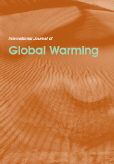
International Journal of Global Warming
Innovating Research for a Sustainable FutureWelcome to the International Journal of Global Warming, a pioneering publication dedicated to advancing knowledge in the crucial fields of global warming, climate change, and environmental policy. Published by INDERSCIENCE ENTERPRISES LTD, this journal serves as an essential platform for interdisciplinary research, examining the multifaceted impacts of global temperature rises on our planet. Since its inception in 2009 and continuing through to 2024, the journal has fostered a vibrant scholarly community, despite currently being indexed in the Q4 quartile for Atmospheric Science and Global and Planetary Change. The journal's unique focus allows researchers, professionals, and students to engage with critical data and innovative methodologies in environmental management, monitoring, and legal policy responses. Submissions are invited from scholars worldwide, though the journal is not open access, ensuring a selective and quality-driven publication process. Beyond its academic contributions, the International Journal of Global Warming plays a significant role in shaping discussions about climate resilience and sustainability practices, making it a vital resource in today's pressing environmental discourse.
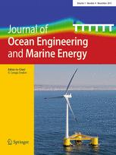
Journal of Ocean Engineering and Marine Energy
Advancing Research for a Greener Marine FutureJournal of Ocean Engineering and Marine Energy, published by SpringerNature, stands at the forefront of interdisciplinary research within the fields of ocean engineering and marine energy. Since its inception in 2015, this journal has aimed to address critical challenges and innovations in energy systems, particularly those harnessed from marine environments, thereby contributing to sustainable development and efficient resource management. With an esteemed Q2 ranking in multiple categories such as Energy Engineering and Power Technology, and Ocean Engineering, the journal serves as a vital platform for researchers, professionals, and students seeking to disseminate and engage with cutting-edge research and technological advancements. Boasting a robust readership and a commitment to open-access principles, the journal fosters a collaborative environment for the exploration of new ideas and approaches in a rapidly evolving sector. By bridging the gap between academia and industry, Journal of Ocean Engineering and Marine Energy remains instrumental in shaping the future of renewable energy solutions and environmental sustainability.

MRS Energy & Sustainability
Fostering Interdisciplinary Insights for a Sustainable WorldMRS Energy & Sustainability is a premier interdisciplinary journal published by SpringerNature, focusing on advancing the understanding of energy systems and sustainability within the context of materials science and engineering. Since its inception in 2014, this journal has rapidly gained recognition in the academic landscape, achieving impressive rankings including Q1 in Electronic, Optical and Magnetic Materials and Mechanics of Materials, and Q2 in Energy Engineering and Power Technology as well as Renewable Energy, Sustainability and the Environment, as of 2023. The journal's ISSN is 2329-2229 and E-ISSN is 2329-2237. With a commitment to open access, it provides researchers and professionals with the latest findings and insights essential for guiding innovations in energy solutions and sustainable practices. The journal's global reach and high-impact reputation make it an invaluable resource for scientists, engineers, and policymakers dedicated to addressing the contemporary challenges of energy and sustainability. With a diverse scope and high Scopus rankings, MRS Energy & Sustainability continues to be at the forefront of research that shapes our energy future.

INTERNATIONAL JOURNAL OF GLOBAL ENERGY ISSUES
Empowering Innovations in Global Energy ResearchThe INTERNATIONAL JOURNAL OF GLOBAL ENERGY ISSUES, published by INDERSCIENCE ENTERPRISES LTD, stands as a vital platform for disseminating innovative research in the fields of energy engineering, nuclear energy, and renewable sustainability. With ISSN 0954-7118 and E-ISSN 1741-5128, this journal has been catering to the energy sector since 1989, advancing scholarly dialogue through critical analyses and discussions of emerging energy technologies and policies. Though currently categorized in the fourth quartile across various energy-related disciplines, the journal aims to bridge knowledge gaps and offer insights that challenge the status quo. Operating from its headquarters in the United Kingdom and accessible to a global audience, the journal encourages submissions that drive interdisciplinary research and provide solutions for pressing global energy challenges. Researchers, professionals, and students alike are invited to contribute and engage with this prestigious journal to influence the future of energy practices.

AIMS Energy
Fueling Knowledge, Powering SolutionsAIMS Energy is a leading academic journal published by the American Institute of Mathematical Sciences (AIMS), dedicated to advancing the field of energy research. With a strong commitment to Open Access since its inception in 2013, this journal offers a platform for researchers, professionals, and students to share innovative findings and enrich the discourse in crucial areas such as Energy Engineering and Power Technology, Fuel Technology, and Renewable Energy, Sustainability and the Environment. Recognized for its quality, AIMS Energy holds a respectable impact with a Q3 ranking in multiple categories as of 2023, and it ranks within the top half of its peers in the Scopus database. The journal's objective is to disseminate high-quality research that addresses contemporary challenges in energy and offers sustainable solutions. By fostering collaboration and discussion among various stakeholders, AIMS Energy plays a critical role in shaping the future of energy technologies and policies.
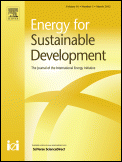
Energy for Sustainable Development
Advancing sustainable solutions for a brighter energy future.Energy for Sustainable Development, published by Elsevier, is a leading interdisciplinary journal dedicated to advancing the academic discourse at the intersection of energy, sustainability, and development. With an impressive Q1 ranking in the fields of Geography, Planning and Development, and Management, Monitoring, Policy and Law, the journal stands out in the academic community for its rigorous peer-reviewed content that addresses crucial energy challenges and promotes innovative solutions. Since its inception, the journal has transitioned through various converged periods, reflecting on dynamic research trends from 1994 onwards. Notably, it boasts meaningful Scopus rankings, including a position in the top 10% of journals for Geography and Planning. Although it currently does not provide open access, the rich pool of research articles published here serves as a vital resource for researchers, professionals, and students committed to fostering sustainable development practices globally. As energy issues become increasingly pivotal in policy formulation and environmental considerations, Energy for Sustainable Development remains a crucial platform for disseminating impactful knowledge and fostering collaboration across disciplines.
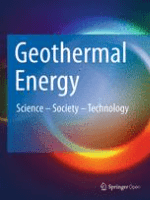
Geothermal Energy
Advancing sustainable solutions through geothermal innovation.Geothermal Energy, an esteemed journal published by SPRINGER, stands at the forefront of research in the fields of Economic Geology, Geotechnical Engineering, and Renewable Energy. With an impressive impact factor and a Q2 category ranking in multiple fields as of 2023, it signifies high-quality research and dissemination in its domain. As an Open Access journal since 2013, Geothermal Energy fosters a broad dissemination of knowledge, ensuring that groundbreaking studies are easily accessible to researchers, industry professionals, and students worldwide. The journal aims to address pressing challenges related to geothermal resources, focusing on innovative methodologies, sustainability practices, and emerging technologies from 2013 to 2024. With its dedicated focus on advancing geothermal energy initiatives, it plays a vital role in contributing to the dialogue on renewable energy solutions and environmental sustainability. Nestled in the United States, this journal not only pushes the boundaries of scientific inquiry but also strengthens the global discourse on energy and the environment.
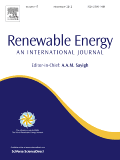
Renewable Energy
Empowering a Sustainable Future.Renewable Energy is a prestigious international journal published by PERGAMON-ELSEVIER SCIENCE LTD, dedicated to advancing the field of renewable energy technologies and their applications. Since its inception in 1991, this journal has provided a critical platform for researchers, professionals, and students to explore innovative solutions in renewable energy, sustainability, and environmental protection. With an impressive impact factor and ranked in the top quartile (Q1) of its category, Renewable Energy is recognized for its high-quality, peer-reviewed research that significantly contributes to the scientific and professional discourse in the sector. The journal is indexed in Scopus, holding an esteemed rank of #21 out of 270 in its field, underscoring its influence and reach. Researchers can access the journal’s articles through traditional subscriptions, ensuring a broad dissemination of vital knowledge that supports the global transition to sustainable energy sources. Addressed from its headquarters in Oxford, England, Renewable Energy is crucial for anyone involved in the journey towards a sustainable future, fostering collaboration and innovation in a critical area of environmental science.
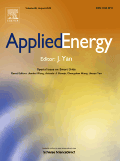
APPLIED ENERGY
Empowering engineering solutions for a greener tomorrow.APPLIED ENERGY, published by Elsevier Science Ltd, is a leading journal dedicated to the advancing field of energy research, focusing on practical engineering solutions to contemporary challenges in energy management, sustainability, and environmental impact. With a rigorous peer-review process and a strong commitment to promoting innovative research, APPLIED ENERGY proudly holds multiple Q1 rankings across various categories, including Building and Construction, Civil and Structural Engineering, and Renewable Energy, reflecting its prestigious position within the academic community. Researchers and professionals can benefit from its comprehensive scope, covering topics that span from policy and technology to market dynamics. Although it is not an open-access journal, it provides access options that facilitate research dissemination. With its historical significance since 1975 and an ambitious outlook up to 2025, APPLIED ENERGY continues to be an essential resource for anyone looking to stay at the forefront of energy research and application.